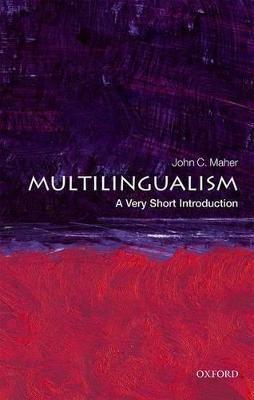Multilingualism: A Very Short Introduction

Multilingualism: A Very Short Introduction
gain new status (Catalan and Maori) or become autonomous national languages (Croatian). Languages can even play a supportive and symbolic role as some territories pursue autonomy or nationhood, such as in the cases of Catalonia and Scotland. In this Very Short Introduction John C. Maher shows how multilingualism offers cultural diversity, complex identities, and alternative ways of doing and knowing to hybrid identities. Increasing multilingualism is drastically changing our view of the value of language, and our notion of the part language plays in national and cultural identities. At the same time multilingualism can lead to social and political conflict, unequal power relations, issues of multiculturalism, and discussions over 'national' or 'official' languages, with struggles over language rights of local and indigenous communities. Considering multilingualism in the context of globalization, Maher also looks at the fate of many endangered languages as they disappear from the world. ABOUT THE SERIES: The Very Short Introductions series from Oxford University Press contains hundreds of titles in almost every subject area. These pocket-sized books are the perfect way to get ahead in a new subject quickly. Our expert authors combine facts, analysis, perspective, new ideas, and enthusiasm to make interesting and challenging topics highly readable.
PRP: 71.93 Lei
Acesta este Prețul Recomandat de Producător. Prețul de vânzare al produsului este afișat mai jos.
64.74Lei
64.74Lei
71.93 LeiLivrare in 2-4 saptamani
Descrierea produsului
gain new status (Catalan and Maori) or become autonomous national languages (Croatian). Languages can even play a supportive and symbolic role as some territories pursue autonomy or nationhood, such as in the cases of Catalonia and Scotland. In this Very Short Introduction John C. Maher shows how multilingualism offers cultural diversity, complex identities, and alternative ways of doing and knowing to hybrid identities. Increasing multilingualism is drastically changing our view of the value of language, and our notion of the part language plays in national and cultural identities. At the same time multilingualism can lead to social and political conflict, unequal power relations, issues of multiculturalism, and discussions over 'national' or 'official' languages, with struggles over language rights of local and indigenous communities. Considering multilingualism in the context of globalization, Maher also looks at the fate of many endangered languages as they disappear from the world. ABOUT THE SERIES: The Very Short Introductions series from Oxford University Press contains hundreds of titles in almost every subject area. These pocket-sized books are the perfect way to get ahead in a new subject quickly. Our expert authors combine facts, analysis, perspective, new ideas, and enthusiasm to make interesting and challenging topics highly readable.
Detaliile produsului










